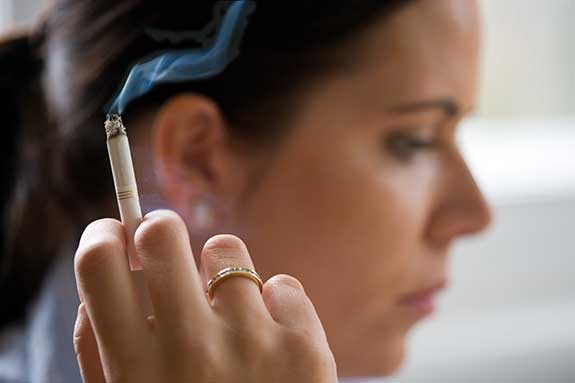Smoking tobacco can cause many serious health issues, including fatal diseases such as cancer. Smoking can also cause significant and financially costly damage to the gums, mouth, and teeth, specifically:
Tooth staining: the nicotine and tar in tobacco rapidly stain teeth yellow. Teeth can even become brown with heavy smoking.
Gum disease and tooth loss: research suggests that smoking may cause almost 75% of adult periodontal diseases. Smoking supports plaque that leads to gum disease. When you smoke, it reduces oxygen and nutrients that flow to the gums to keep them healthy and resistant to bacteria. Gum disease also progresses more rapidly amongst smokers. As the disease progresses, teeth can be lost.
More challenges when treating oral health issues: smoking can wear down teeth and weaken jawbone through infections or decay. As a result, it may be more difficult to replace lost teeth, for instance with implants and bridges. Because smoking weakens the immune system, treating gum disease may be more difficult and slower.
Bad breath: many people who smoke find that they suffer from bad breath. This may affect confidence levels and interpersonal relationships.
Oral cancer: smoking is a leading cause of mouth cancer. Many studies indicate that people who smoke are at a significantly higher risk of developing oral cancer than people who do not smoke.
Increased sensitivity to hot and cold: when damaged gum tissue leads to receding gums and exposed tooth roots, sensitivity to hot and cold develops.
Smoking increases your risk of developing nicotine addiction, cancer (of the throat, lungs, and/or other parts of the body), heart disease and/or stroke, bronchitis, premature ageing, mouth sores, reduced sense of smell and taste, decreased immune system responsiveness, increased heart rate, difficulties breathing.
Steps to take if you smoke
Visit your dentist routinely: do not miss routine visits because these full examinations will allow your dentist to ensure your overall oral health is good and to identify any budding issues early on. Your dentist not only examines your gums and teeth, but your mouth including cheeks, tongue, and throat, particularly for early signs of oral cancer and periodontal disease (gingivitis, gum disease).
Your dentist will advise you on how frequently you should visit.
Special kinds of toothpaste for people who smoke: your dentist may recommend a toothpaste targeted to smokers, which may reduce staining on teeth. Your dentist can recommend a product.
Mouthwashes: these can be used to freshen breath but are a short-term solution.
Receive support to stop smoking: your dentist may be able to provide references to organizations or groups that can support you to quit smoking and provide recommendations for medications to aid the process.
If you or a loved one is smoking, schedule a visit for a full examination or further information on the impacts of smoking on oral and overall health and how to quit smoking.

